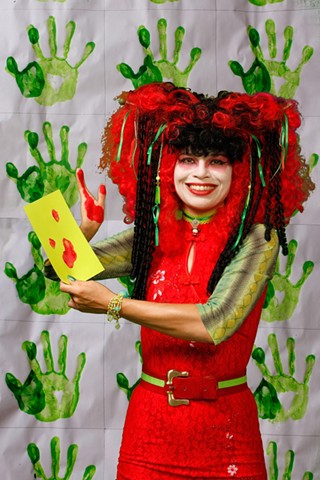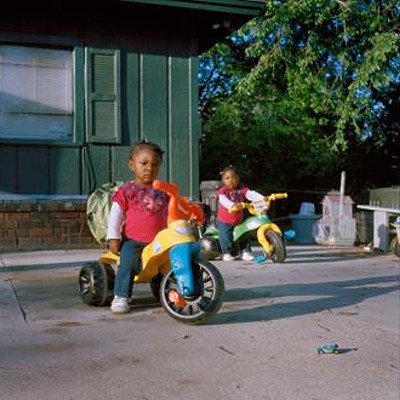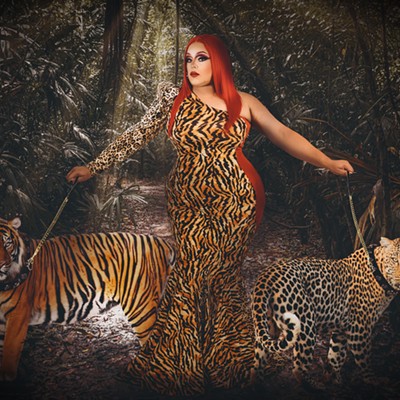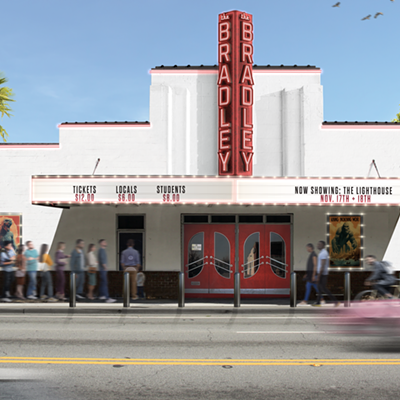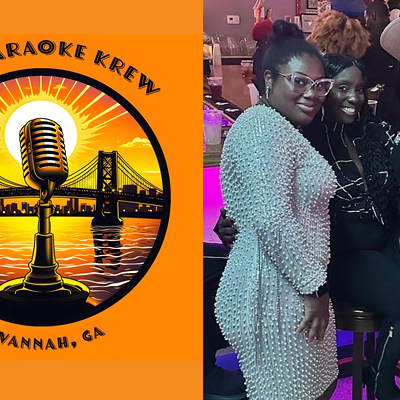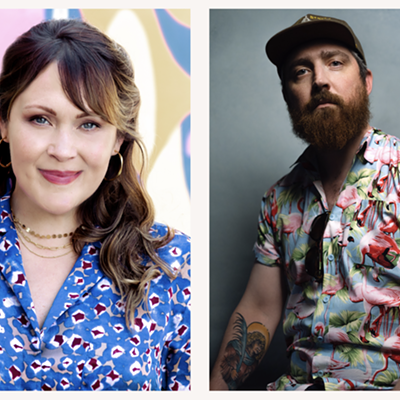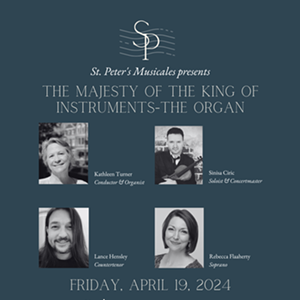Artist Liz Gibson mixes up media like a skilled chef tosses up ingredients: Digital photography, video clips, paint, clay, costumes, song and spoken word find their way into her pieces. It all adds up to a crackling stir-fry that stimulates the visual and visceral senses.
But there's more to Gibson than color and play. Born with only two fingers on her right hand, the Pennsylvania native explores perceptions about birth defects and diversity, and her work can include wildly-dressed characters, massive backdrops and tongue-in-cheek social statements (last Thanksgiving she put an original spin on the pervasive children's craft project with a series of "two-fingered turkeys.")
She has coined a term to describe the empowering effect of using her "deformity" in her performances: Deformance art.
Gibson brings her funny and thoughtful one-woman show, "The Luck of the Draw and Other Tales of Unnatural Selection," to the Indigo Sky Gallery this Friday, Oct. 11 in honor of Disability Awareness Month. She spoke with Connect from Jacksonville, where she teaches 3-D design and visual art at the University of North Florida.
Have you always incorporated your physical difference into your artwork?
Liz Gibson: I've always been an artist, even before I knew what an artist was. Since I was little, I've written poems, wrote songs. I did a lot of drawing and painting and was interested in fashion and hair, so that streak has always been in me. When it came time to go to college, there was no question of me taking up any academic discipline other than art.
But I didn't really talk about the topic of my deformity because I was shy. That transformation happened as an undergrad at USF in Tampa, and I did a piece called "The Three-Legged Fox." That was the first time I started to put myself into my own work.
Do you feel like your two-fingered hand has hampered you in any way?
Liz Gibson: I went through stages. When I was younger, it was more of an embarrassing thing. When I was a teenager, it had influences and effects on the way I felt perceived. Once I got past the teenage years, the experience became one of acceptance. I truly accepted it the point that it didn't hamper me at all in terms of the way I perceive myself.
I found solace in stories, especially The Glass Menagerie by Tennessee Williams, the sister character who's very insecure. You're led to believe in the play that she has some deformity or infirmity — he doesn't specify it exactly — something to do with her foot. There's a huge part that talks about her struggle and that was very affirming to me.
It does have a physical limitation for me especially as the world becomes more about typing and texting. I don't have the same proficiency that people with 10 fingers do. That's not to say some people who are missing digits don't type proficiently! But I've taken classes to learn how to type as a seven-fingered person and it doesn't seem to work out very well. [laughs]
What persona can we expect to show up at this performance?
Liz Gibson: The character that I'm performing as in Savannah is called Ben Wa Betty, and she's my archetypal teenager. The show is called "Luck of the Draw and Other Tales of Unnatural Selection," and the stories are about being a teenager and finding your way to fit in. Looks are so important as a teenager, and if you just happen to be by genetic luck somewhat nice-looking, but also by "unluck" someone with a birth defect, it makes for a weird mixture.
There would be times, because my deformity is so small, that I could easily put my hand in a pocket and hide it, subconsciously or intentionally. So say a boy who didn't know about it would like me, and flirt with me or maybe even ask me out, and I'd have to make decisions that most teenagers would even have to think about. Do I show him my hand now? or what? I experimented with it — there was no guidebook showing me how to go. It was a very confusing time.
And on top of it all, I was the only person I knew with any kind of birth defect so I was very alone in that struggle.
I also just happened to go to high school during the time when being a freak became something to fetishize, something to want to be. People started dyeing their hair strange colors and piercing their faces. These were the same people I had gone to school with since kindergarten who made fun of me because I was different and were now going to great lengths to make themselves strangely different. It was a weird dynamic.
Is the show appropriate for all ages?
Liz Gibson: Definitely! Whether you have a physical abnormality or anything else you might be overly self-aware about, you feel like it's the worst thing that could ever happen to you, it's bad luck. There's hopefully another moment in your life when you're a mature adult when you feel like you've learned some of life's most important lessons. And suddenly this strange transformation happens where the thing you perceived as bad luck is then good luck.
I also think about natural selection and anomalies. In scientific study, anomalies are where evolution happens. That aberrant evolutionary trait can possibly lead to a better life. So it's a metaphor for my own deformity that led me to have the life I have and be the artist I am. I did a show in 2008 called "Anomaly 1 in 1000" where I covered the gallery in handprints of my right hand. I wanted people to be immersed in a world where everything is one way and you are different.
What do you want people to come away with after the "deformance"?
Liz Gibson: October is Disability Awareness month, but awareness is kind of a generic word. More than awareness, I want to promote the idea and appreciation of diversity, not just to people with some kind of physical impairment but anything that makes us different. Ultimately, the thing that makes us different is the most empowering.
There's an importance to it — getting back to the idea of anomalies, it's better that there are things that are different and that diversity exists. Sure, on a poetic level, you could say everything would be boring, but diversity does more than make things not boring — it helps to move everything forward. Not just for the individual but also for society.
It puts other people in a place where they have to ask the important questions about how they perceive others and how they perceive themselves.

